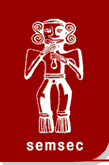

Dale A.Olsen PrizePrevious Award RecipientsProcedures |
Dale A.Olsen PrizeThe Dale A. Olsen Prize is awarded annually to the best student paper presented at the annual SEMSEC meeting. The prize is named in honor of Dale A. Olsen, founding member of SEMSEC and Professor of Ethnomusicology at Florida State University. The award is only given if there is a deserving student paper that meets the criteria of the prize. A student shall be defined as a person pursuing an active course of studies in a degree program. This will include persons who are engaged in writing the doctoral dissertation, but not those who are teaching full time while doing so. Previous Award Recipients of the Dale A. Olsen Prize2009Jonah Chambers 2008Elizabeth Whittenburg 2007Jason McCoy Honorable Mention: Plamena Kourtova, Florida State University, "Suffering and Transformation in the Firewalking Ritual of the Bulgarian Nestinari" 2006Trevor S. Harvey 2005Margaret Jackson 2004Holly Wissler 2003Lara Greene 2002no award given. 2001David Pruett Dale A. Olsen Prize ProceduresFundingThe award of $100 will be split 50/50, with funds provided by Dale Olsen and the SEMSEC budget. The SEMSEC treasurer will send a check to the awardee. Prize CommitteeEach year the SEMSEC president will appoint 3-5 people from different institutions, drawn from people who plan to attend the meeting, such as SEMSEC officers and session moderators. The program committee may serve as the prize committee, providing all program committee members attend the conference. Prize committee members should not be students. The program committee chair will also serve as the award chair, provided he or she attends the meeting. Award ProceduresStudents wishing to be considered for the award should submit 5 (or however many members there are of the award committee) hard copies of the paper at registration along with contact information (name, institutional affiliation, mailing address, phone number, email). Late papers will not be considered for the prize. The award will be based on oral and written versions of the paper. The prize will not be awarded if a deserving paper is not submitted. Winners will be announced on the chapter website, in the SEM Newsletter, and at the business meeting during the next SEM national meeting. At the discretion of the chair, committee members may be asked to provide written feedback to students. For example, in 2003, each committee member was assigned one or more papers for more detailed comments to be given directly to the student. Award CriteriaCommittee members rank papers on a scale of 1 to 5, 1 being the best score, according to the following criteria. Note award must be based on both written and oral presentation. Written Presentation:
Oral Presentation:
|